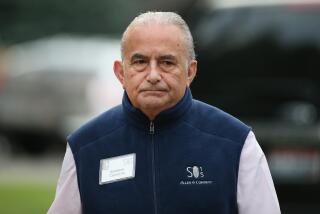Venezuela’s Chavez to seize bank
- Share via
CARACAS — Advancing his policy of taking over major foreign companies, Venezuelan President Hugo Chavez said Thursday that he would nationalize Spanish-owned Banco Venezuela, the country’s third-largest financial institution.
Chavez said during an afternoon telecast that he was seizing the bank because its owner, Banco Santander, was planning to sell it anyway. The Spanish concern, which acquired the bank in 1996, had not issued a formal comment by Thursday evening.
The announcement follows other nationalizations in recent years in which Chavez has paid foreign owners for their controlling interest in “strategic” concerns to further his socialist “Bolivarean revolution.”
Over the last two years, Chavez has taken control of the country’s largest phone company from Verizon Communications Inc. of New York. He also forced AES Corp. of Arlington, Va., to sell its majority interest in Caracas’ main power firm. The socialist leader also has imposed the dominance of the Venezuelan state oil company, Petroleos de Venezuela, on all major oil operations. That reversed a 1990s policy under which foreign companies were invited to revive lagging oil fields and develop immense heavy oil reserves.
Some companies, such as Chevron Corp. of San Ramon, Calif., agreed to Chavez’s terms to cede control of oil production projects and remain in Venezuela as minority partners. But Exxon Mobil Corp. of Irving, Texas, and others left under protest and filed cases with international arbiters.
Spain’s two largest banks, Banco Santander and Banco Bilbao Vizcaya, led a “reconquest” by Spanish companies of Latin American businesses in the 1990s when most countries relaxed foreign investment rules and privatized many state-run monopolies. Santander bought Banco de Venezuela, and Bilbao Vizcaya bought Banco Provincial.
But the purchases have not always worked out. Spanish investors in several utilities have absorbed losses, and the two Spanish banks took billion-dollar hits when Argentina’s financial system collapsed in 2001.
--
More to Read
Sign up for Essential California
The most important California stories and recommendations in your inbox every morning.
You may occasionally receive promotional content from the Los Angeles Times.













